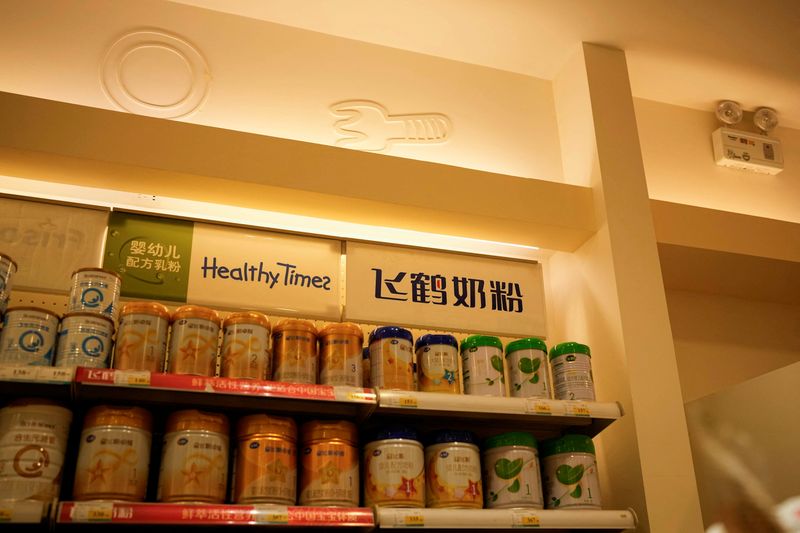Chinese baby product firms seek to age up, sell more abroad as population falls
5/5

© Reuters. Feihe milk powders are displayed on shelves in a store in Shanghai, China, April 3, 2023. REUTERS/Aly Song
2/5
USD/CNY
+0.04%
Add to/Remove from Watchlist
Add to Watchlist
Add Position
Position added successfully to:
+ Add another position
Close
By Farah Master
HONG KONG (Reuters) – For many of China’s manufacturers of baby and children’s products, painful reverberations from last year’s historic decline in the country’s population are already upon them.
Domestic sales are shrinking and the scramble is on to develop new streams of revenue, whether that be diversifying into products for adults or boosting offerings in overseas markets with younger populations like Southeast Asia and India.
Hong Kong-listed Health and Happiness (H&H), which gains nearly half of its revenue from baby products such as infant formula, food and diapers, is one such company.
Revenue for its Dodie diaper brand slid 12% in mainland China last year as a fresh decline in the birth rate to a record low exacerbated oversupply and caused prices to drop, says interim Chief Executive Akash Bedi.
Global expansion and diversification are H&H’s priorities this year and beyond, Bedi added. The company managed to offset the fall in diaper demand with a 12.5% jump in global revenue for the adult nutrition division housing its Swisse-branded vitamins and supplements.
“In newer markets such as Vietnam, Thailand, India, and Malaysia, the (Swisse) brand has been growing both offline and online channels to grow share,” he said via email.
China’s market for baby food and diapers is the world’s largest at $37.9 billion, accounting for around a third of global sales annually, according to research from Euromonitor.
But the knock-on effects from China’s first population drop in six decades have been swift and the market is forecast to contract this year for the first time since Euromonitor began keeping track in 2012. Including this year’s fall to $37.6 billion, it is expected to shrink 2% to $37.2 billion by 2025.
Birth rate declines are also not expected to end any time soon, with analysts noting young Chinese adults are not keen to have more than one or even any kids due to the sky-high costs of child-rearing, especially education.
China’s lowest birth rate on record https://www.reuters.com/graphics/CHINA-ECONOMY/DEMOGRAPHICS/zdpxdrarmpx/chart.png
Non-diversified makers of baby products are “going to face declining margins, bad revenues, and their stock prices are going to collapse because it’s going to take them one, two, maybe even three years to come up with a new strategy and execute,” said Shaun Rein, managing director of China Market Research Group (CMR).
CMR estimates the China market for children’s goods and services (including education) to currently be worth some $500 billion annually and predicts it will shrink 15%-20% over the next five years.
Slowing revenue for baby products in China Slowing revenue for baby products in China https://www.reuters.com/graphics/ASIA-POPULATION/CHINA-BABY%20PRODUCTS/egvbyezqxpq/chart.png
ADULT DIAPERS, ADULT MILK POWDER
Fujian-based Hengan International Group Company, a maker of sanitary napkins, diapers and tissues, saw its overall diaper sales fall 1.4% last year as products at the cheaper end of its baby diaper range lost favour. Adult diaper revenue, however, shot up 13% – highlighting how China’s rapidly ageing population is prompting shifts in consumer spending.
Noting “huge room for development”, Hengan plans to invest more in adult care products such as its ElderJoy diaper brand, aiming to expand market share both at home and in Southeast Asia, it said in an earnings statement last month.
Perhaps the most hurt by China’s demographic trends have been domestic manufacturers of infant milk formula with less diversified product lines, with many posting steep sales drops in 2022 after years of growth.
China Feihe, the country’s biggest maker of infant formula, saw revenues slide 6.4%. Sales for Yashili International Holdings Ltd plunged 15.7% while those for Ausnutria Dairy Corp Ltd tumbled 9.1%.
Falling revenues for Chinese infant formula makers https://www.reuters.com/graphics/ASIA-POPULATION/CHINA-BABY%20PRODUCTS/lgvdkgqzwpo/chart.png
Shares for the three firms now trade between a third and a fifth of their all-time highs. None responded to requests for comment.
All are expanding into products for older people, their earnings reports said. In particular, milk powder products for adults that are fortified with vitamins and minerals – while mostly a nascent China-only market segment – have been targeted as a promising area for development.
Yashili, for example, said it will focus on making milk powder for 3-to-15-year-olds as well as adults, particularly the elderly. It has also recently launched products targeting young women, including a goji berry puree and fruit oatmeal.
Makers of children’s clothing are also having to become more creative as they pursue growth.
“The impact of declining birth rates is very, very, very real,” said Zhang Yan, founder of Shanghai-based children’s clothing line natunakids.
“We now make a lot of matching parent-child outfits. Whereas once an item of clothing would have only been made for kids, I am now asking my craftspeople to also make adult versions,” she said.
($1 = 6.9110 Chinese yuan)